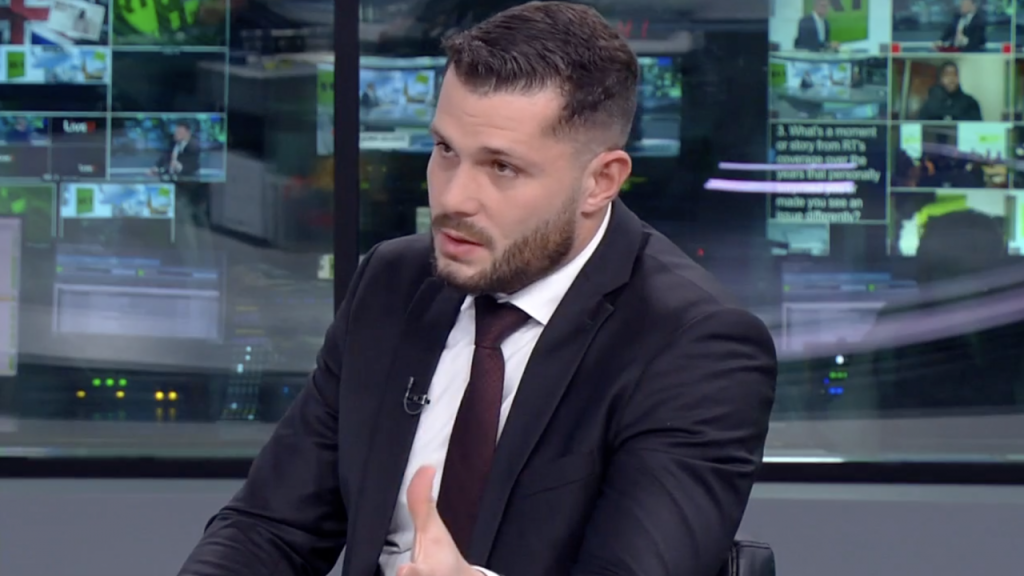Listen to the article
Slovak politician Martin Belusky sparked international controversy after attending a celebration marking the 20th anniversary of Russia-24, a Russian state-controlled television network. The event, held in Moscow, comes amid heightened tensions between the European Union and Russia over the ongoing conflict in Ukraine.
Belusky, a member of the far-right People’s Party Our Slovakia and the country’s parliament, was photographed at the gala alongside prominent Russian media figures and state officials. His attendance has drawn sharp criticism from Slovak government officials and EU representatives who view it as undermining European solidarity against Russian aggression.
Russia-24, launched in 2006 as Vesti, has become a key component of the Kremlin’s media apparatus, frequently accused by Western governments and media watchdogs of spreading disinformation and propaganda that aligns with Russian state interests. The network has played a significant role in Russia’s information campaign regarding the Ukraine conflict, often presenting narratives that contradict Western reporting.
“This appearance represents a concerning alignment with a media outlet that has repeatedly been identified as a vehicle for state propaganda,” said Miroslav Wlachovsky, Slovakia’s Minister of Foreign Affairs, in a statement released shortly after images of Belusky at the event emerged on social media. “At a time when European unity is essential, such actions undermine our collective stance against Russian aggression in Ukraine.”
Slovakia, a NATO and EU member that shares a border with Ukraine, has been navigating a complex relationship with Russia since the full-scale invasion began in February 2022. While previous administrations provided substantial military support to Ukraine, the current government led by Prime Minister Robert Fico has adopted a more cautious approach, recently halting arms deliveries to Kyiv.
Belusky defended his attendance in a brief statement, claiming he was participating in “cultural diplomacy” and asserting that dialogue with Russia remains important despite current tensions. “Closing all channels of communication serves no one’s interests,” he said. “I maintain that we must keep diplomatic doors open even when we disagree.”
The Slovak opposition quickly condemned Belusky’s Moscow visit. “This is not diplomacy; this is legitimizing a propaganda machine that works to divide Europe and justify war,” said Michal Šimečka, leader of the Progressive Slovakia party. “Our representatives should be standing firmly with our allies, not celebrating Russian state media.”
Media experts note that Russia-24’s anniversary celebration comes during a period of intensified control over Russia’s information landscape. Since the beginning of what the Kremlin calls its “special military operation” in Ukraine, Russian authorities have shut down independent media outlets and implemented strict laws against what they deem “false information” about the military.
The European Commission responded to the incident by reiterating its concerns about Russian information operations targeting EU member states. “Russian state-controlled media continues to be a tool for the Kremlin to spread narratives that undermine European unity and democratic values,” said a Commission spokesperson.
This controversy emerges against a backdrop of increasing concern about Russian influence in Central European politics. Slovakia, Hungary, and other nations in the region have seen political movements questioning the consensus on Ukraine policy and EU sanctions against Russia.
Political analysts suggest Belusky’s appearance at the Moscow event may be calculated to appeal to segments of Slovak society nostalgic for historical ties with Russia or skeptical of Western policies toward Moscow.
The incident has reignited debate within Slovakia about the country’s foreign policy orientation and the appropriate boundaries for diplomatic engagement with Russia while it continues its military campaign against neighboring Ukraine.
As the Slovak government considers its response to this diplomatic incident, the controversy highlights the ongoing challenge faced by EU countries in maintaining a united front against Russian information operations while navigating their individual national interests and domestic political pressures.
Fact Checker
Verify the accuracy of this article using The Disinformation Commission analysis and real-time sources.



